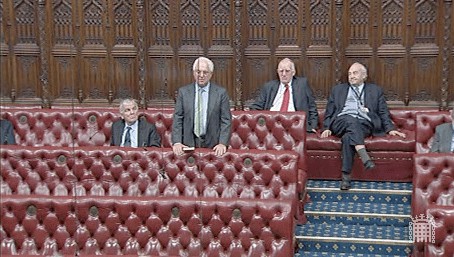
ISP customers who have their service suspended after illegally downloading content may have to pay to restore their connection, under an amendment proposed to the Digital Economy Bill.
Lord Lucas’ amendment 154 would add a new technical measure to the already-proposed ideas like bandwidth throttling and account suspension – “the payment of an additional fee by the subscriber for the maintenance of unrestricted internet access”. In other words, three strikes and you pay. Payments would go to a proposed new “licensing body”.
It’s one of 299 amendments proposed by Lords to the bill during committee stage, which resumes Tuesday, in which Lords are discussing the merits of each others’ views before compiling a version to put to House Of Commons MPs.
Another Lucas proposal would validate the belief of some record labels and movie studios that one illegally downloaded song or film amounts to one lost sale. Amendment 105 states that the process by which copyright holders would alert ISPs to alleged piracy should “value … an infringement on the basis of the benefit that would have accrued to the owner had the copyright material been legally acquired from an ordinary internet retailer”.
But the bill doesn’t actually carry provision for copyright holders being reimbursed for the loss. And there are two exceptions…
— Illegal downloads of as-yet-unreleased material (ie. leaked albums or films) would be subject to a 10x valuation.
— A zero valuation must be used if the material has been illegally downloaded in a format the copyright holder has not made available legally (let’s say, .ogg?).
Other key proposals…
Punishing the pirates…
— 187: Lord Whitty wants to ensure that “that technical measures may only be applied against subscribers after a court ruling which determines that a subscriber has infringed copyright through the use of a peer-to-peer filesharing network”. The court would also be able to overturn a technical measure.
Limits on scope…
— 76: Lords Razzall and Clement-Jones want to ensure that copyright holders can only request information about a particular freeloader if that person has had 50 or more such requests filed against him/her.
— 85: A limit to the “strikes”? Miller wants to ensure: “The threshold which may be set under subsection (3)(b) shall not be less than 10 infringements per annum.”
— 101: Lords Howard and De Mauley want ISPs to limit data retention on freeloading subscribers to one year.
— 92a: Lords Razzall and Clement-Jones want the obligations on ISPs to apply only to those for whom unlawful activity makes up more than 25 percent of their network traffic.
Individuals, not groups…
— 82: As far as these “copyright infringement lists go”, Baroness Miller wants to ensure that “A subscriber may only be an individual and nothing in this section shall apply to communal networks.”
— 109: Help for parents of disobedient teens?: Lord Lucas warrants “an appeal must succeed if the subscriber can show on the balance of probabilities that he had no reasonable means to prevent the infringement”.
— 146: Lords Razzall and Clement-Jones also want to ensure that “a subscriber is not liable in respect of copyright infringement for the use of that network by authorised or unauthorised third parties”. Libraries and schools would also be off the hook.
Appeals and counterclaims…
— 118-119: Lord Whitty wants to ensure that appeals lodged by alleged freeloaders are paid for by copyright owners themselves and that, during appeal, the burden of proof also lays with that copyright owner.
— 129: Lord Lucas is seeking an unlikely amendment which would write in to the Copyright, Designs and Patents Act the right for anyone accused of copyright infringement to bring a counter-claim against the copyright holder, seek damages and an injunction against continued accusations.
Defining pirate environments…
— 111A/130/131: Lord Whitty wants to limit the scope of these sanctions only to pirating “through peer-to-peer filesharing networks” – that would leave out many other channels for freeloading warned of by some copyright holders.
— 75: Lord Lucas wants a specific new “Obligation to block access to a website” added to the Communications Act: “An internet service provider shall, on the presentation of the declaration, block access to the website from its services.””
Capping Mandy…
— 140: Lord Lucas wants to ensure Mandelson can only order Ofcom to implement the new system on ISPs after two years, not immediately – this is as per the original Digital Britain white paper.
— 198: Lords Howard and de Mauley want to remove Mandelson’s ability to arbitrarily alter the maximum penalty for filesharing.
Regulating measures…
— 132: Lords Rising and De Mauley want the progress reports on piracy, which would be compiled by Ofcom for the government, to acknowledge the level of subscribers’ lawful, as well as unlawful, downloading of content. Lords also want the reports to assess impact on other factors like broadband adoption.
— 214: Lord Whitty wants to amend the Electronic Commerce Directive Regulations 2002 to ensure that “search engines, hyperlinkers and aggregators” are not on the hook for copyright abuse on their service if they are not aware of it.